Analysis of Hofstede's Cultural Dimensions in Business Report
VerifiedAdded on 2020/10/05
|6
|1332
|350
Report
AI Summary
This report delves into Hofstede's cultural dimensions, a framework for understanding the impact of culture on values within a society. The analysis focuses on key dimensions such as individualism versus collectivism, power distance, and uncertainty avoidance, illustrating how these cultural aspects affect business environments and organizational practices. The report provides critical evaluations and examples, such as the United States' individualistic culture and Asian countries' collectivist approach, and suggests strategies for businesses to adapt to different cultural contexts. It highlights the importance of considering these dimensions for effective cross-cultural communication, successful business operations, and creating a healthy work environment. The conclusion emphasizes the benefits of adopting culturally sensitive strategies to enhance productivity and achieve organizational goals. The report references various academic sources to support its findings.

STUDY SKILLS FOR
HIGHER EDUCATION
HIGHER EDUCATION
Paraphrase This Document
Need a fresh take? Get an instant paraphrase of this document with our AI Paraphraser
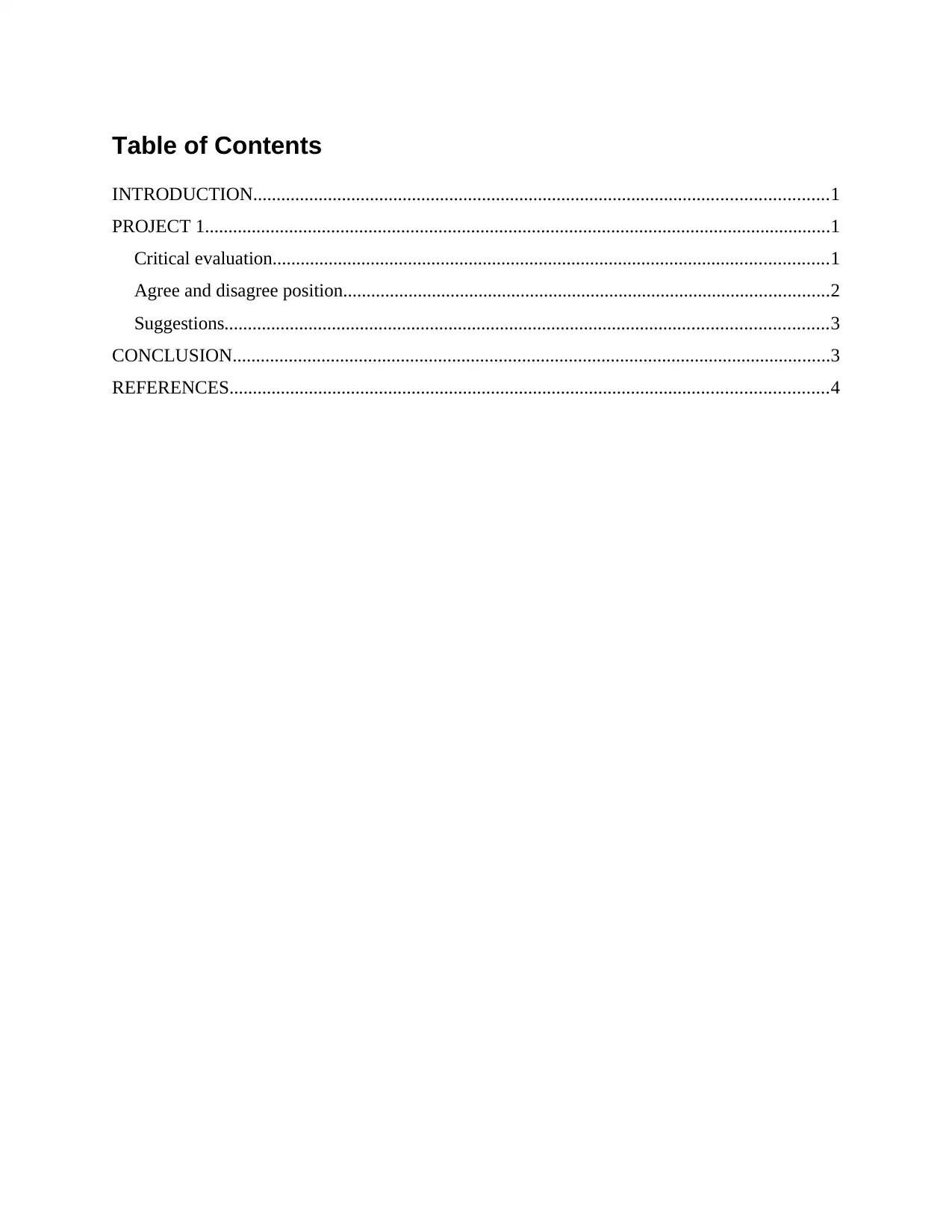
Table of Contents
INTRODUCTION...........................................................................................................................1
PROJECT 1......................................................................................................................................1
Critical evaluation.......................................................................................................................1
Agree and disagree position........................................................................................................2
Suggestions.................................................................................................................................3
CONCLUSION................................................................................................................................3
REFERENCES................................................................................................................................4
INTRODUCTION...........................................................................................................................1
PROJECT 1......................................................................................................................................1
Critical evaluation.......................................................................................................................1
Agree and disagree position........................................................................................................2
Suggestions.................................................................................................................................3
CONCLUSION................................................................................................................................3
REFERENCES................................................................................................................................4
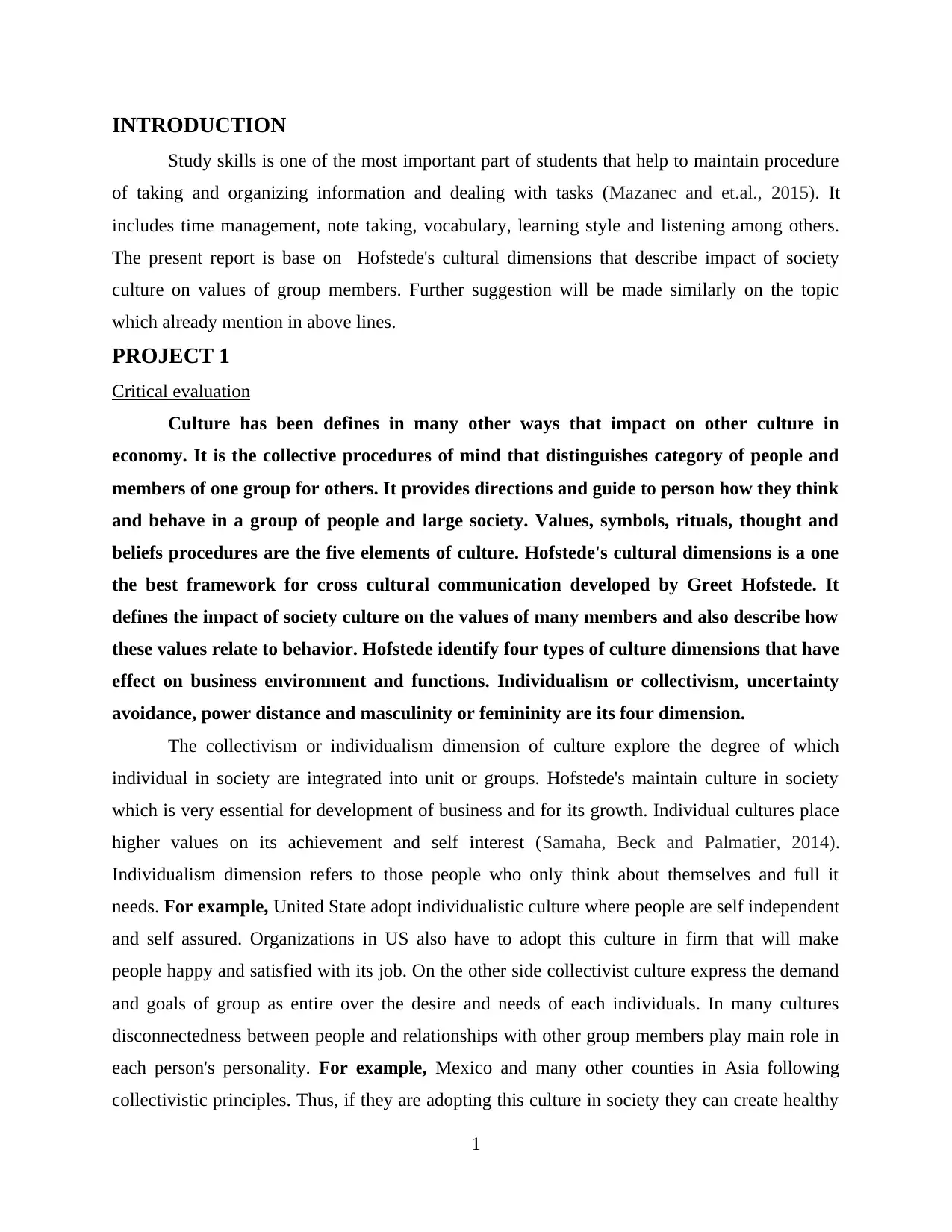
INTRODUCTION
Study skills is one of the most important part of students that help to maintain procedure
of taking and organizing information and dealing with tasks (Mazanec and et.al., 2015). It
includes time management, note taking, vocabulary, learning style and listening among others.
The present report is base on Hofstede's cultural dimensions that describe impact of society
culture on values of group members. Further suggestion will be made similarly on the topic
which already mention in above lines.
PROJECT 1
Critical evaluation
Culture has been defines in many other ways that impact on other culture in
economy. It is the collective procedures of mind that distinguishes category of people and
members of one group for others. It provides directions and guide to person how they think
and behave in a group of people and large society. Values, symbols, rituals, thought and
beliefs procedures are the five elements of culture. Hofstede's cultural dimensions is a one
the best framework for cross cultural communication developed by Greet Hofstede. It
defines the impact of society culture on the values of many members and also describe how
these values relate to behavior. Hofstede identify four types of culture dimensions that have
effect on business environment and functions. Individualism or collectivism, uncertainty
avoidance, power distance and masculinity or femininity are its four dimension.
The collectivism or individualism dimension of culture explore the degree of which
individual in society are integrated into unit or groups. Hofstede's maintain culture in society
which is very essential for development of business and for its growth. Individual cultures place
higher values on its achievement and self interest (Samaha, Beck and Palmatier, 2014).
Individualism dimension refers to those people who only think about themselves and full it
needs. For example, United State adopt individualistic culture where people are self independent
and self assured. Organizations in US also have to adopt this culture in firm that will make
people happy and satisfied with its job. On the other side collectivist culture express the demand
and goals of group as entire over the desire and needs of each individuals. In many cultures
disconnectedness between people and relationships with other group members play main role in
each person's personality. For example, Mexico and many other counties in Asia following
collectivistic principles. Thus, if they are adopting this culture in society they can create healthy
1
Study skills is one of the most important part of students that help to maintain procedure
of taking and organizing information and dealing with tasks (Mazanec and et.al., 2015). It
includes time management, note taking, vocabulary, learning style and listening among others.
The present report is base on Hofstede's cultural dimensions that describe impact of society
culture on values of group members. Further suggestion will be made similarly on the topic
which already mention in above lines.
PROJECT 1
Critical evaluation
Culture has been defines in many other ways that impact on other culture in
economy. It is the collective procedures of mind that distinguishes category of people and
members of one group for others. It provides directions and guide to person how they think
and behave in a group of people and large society. Values, symbols, rituals, thought and
beliefs procedures are the five elements of culture. Hofstede's cultural dimensions is a one
the best framework for cross cultural communication developed by Greet Hofstede. It
defines the impact of society culture on the values of many members and also describe how
these values relate to behavior. Hofstede identify four types of culture dimensions that have
effect on business environment and functions. Individualism or collectivism, uncertainty
avoidance, power distance and masculinity or femininity are its four dimension.
The collectivism or individualism dimension of culture explore the degree of which
individual in society are integrated into unit or groups. Hofstede's maintain culture in society
which is very essential for development of business and for its growth. Individual cultures place
higher values on its achievement and self interest (Samaha, Beck and Palmatier, 2014).
Individualism dimension refers to those people who only think about themselves and full it
needs. For example, United State adopt individualistic culture where people are self independent
and self assured. Organizations in US also have to adopt this culture in firm that will make
people happy and satisfied with its job. On the other side collectivist culture express the demand
and goals of group as entire over the desire and needs of each individuals. In many cultures
disconnectedness between people and relationships with other group members play main role in
each person's personality. For example, Mexico and many other counties in Asia following
collectivistic principles. Thus, if they are adopting this culture in society they can create healthy
1
⊘ This is a preview!⊘
Do you want full access?
Subscribe today to unlock all pages.

Trusted by 1+ million students worldwide
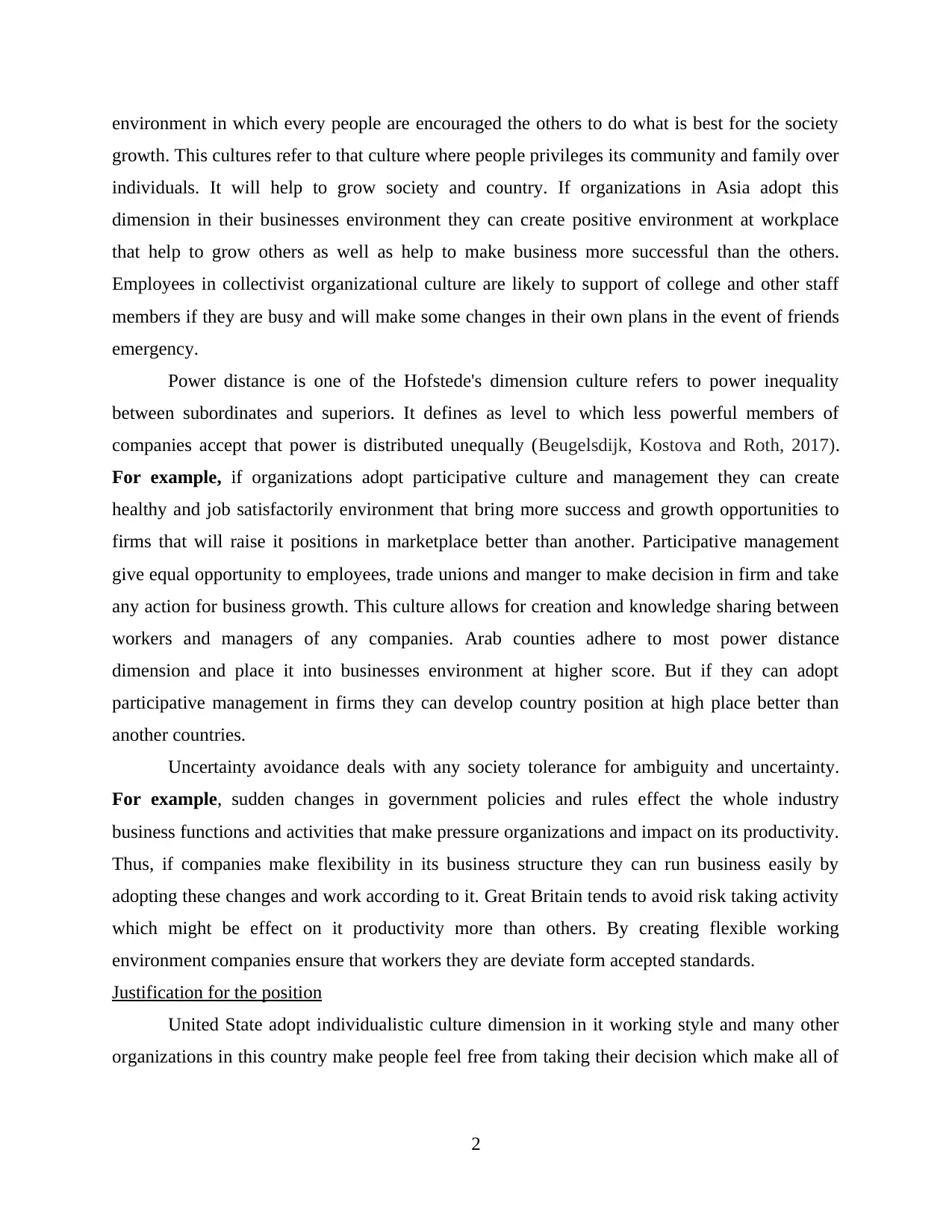
environment in which every people are encouraged the others to do what is best for the society
growth. This cultures refer to that culture where people privileges its community and family over
individuals. It will help to grow society and country. If organizations in Asia adopt this
dimension in their businesses environment they can create positive environment at workplace
that help to grow others as well as help to make business more successful than the others.
Employees in collectivist organizational culture are likely to support of college and other staff
members if they are busy and will make some changes in their own plans in the event of friends
emergency.
Power distance is one of the Hofstede's dimension culture refers to power inequality
between subordinates and superiors. It defines as level to which less powerful members of
companies accept that power is distributed unequally (Beugelsdijk, Kostova and Roth, 2017).
For example, if organizations adopt participative culture and management they can create
healthy and job satisfactorily environment that bring more success and growth opportunities to
firms that will raise it positions in marketplace better than another. Participative management
give equal opportunity to employees, trade unions and manger to make decision in firm and take
any action for business growth. This culture allows for creation and knowledge sharing between
workers and managers of any companies. Arab counties adhere to most power distance
dimension and place it into businesses environment at higher score. But if they can adopt
participative management in firms they can develop country position at high place better than
another countries.
Uncertainty avoidance deals with any society tolerance for ambiguity and uncertainty.
For example, sudden changes in government policies and rules effect the whole industry
business functions and activities that make pressure organizations and impact on its productivity.
Thus, if companies make flexibility in its business structure they can run business easily by
adopting these changes and work according to it. Great Britain tends to avoid risk taking activity
which might be effect on it productivity more than others. By creating flexible working
environment companies ensure that workers they are deviate form accepted standards.
Justification for the position
United State adopt individualistic culture dimension in it working style and many other
organizations in this country make people feel free from taking their decision which make all of
2
growth. This cultures refer to that culture where people privileges its community and family over
individuals. It will help to grow society and country. If organizations in Asia adopt this
dimension in their businesses environment they can create positive environment at workplace
that help to grow others as well as help to make business more successful than the others.
Employees in collectivist organizational culture are likely to support of college and other staff
members if they are busy and will make some changes in their own plans in the event of friends
emergency.
Power distance is one of the Hofstede's dimension culture refers to power inequality
between subordinates and superiors. It defines as level to which less powerful members of
companies accept that power is distributed unequally (Beugelsdijk, Kostova and Roth, 2017).
For example, if organizations adopt participative culture and management they can create
healthy and job satisfactorily environment that bring more success and growth opportunities to
firms that will raise it positions in marketplace better than another. Participative management
give equal opportunity to employees, trade unions and manger to make decision in firm and take
any action for business growth. This culture allows for creation and knowledge sharing between
workers and managers of any companies. Arab counties adhere to most power distance
dimension and place it into businesses environment at higher score. But if they can adopt
participative management in firms they can develop country position at high place better than
another countries.
Uncertainty avoidance deals with any society tolerance for ambiguity and uncertainty.
For example, sudden changes in government policies and rules effect the whole industry
business functions and activities that make pressure organizations and impact on its productivity.
Thus, if companies make flexibility in its business structure they can run business easily by
adopting these changes and work according to it. Great Britain tends to avoid risk taking activity
which might be effect on it productivity more than others. By creating flexible working
environment companies ensure that workers they are deviate form accepted standards.
Justification for the position
United State adopt individualistic culture dimension in it working style and many other
organizations in this country make people feel free from taking their decision which make all of
2
Paraphrase This Document
Need a fresh take? Get an instant paraphrase of this document with our AI Paraphraser
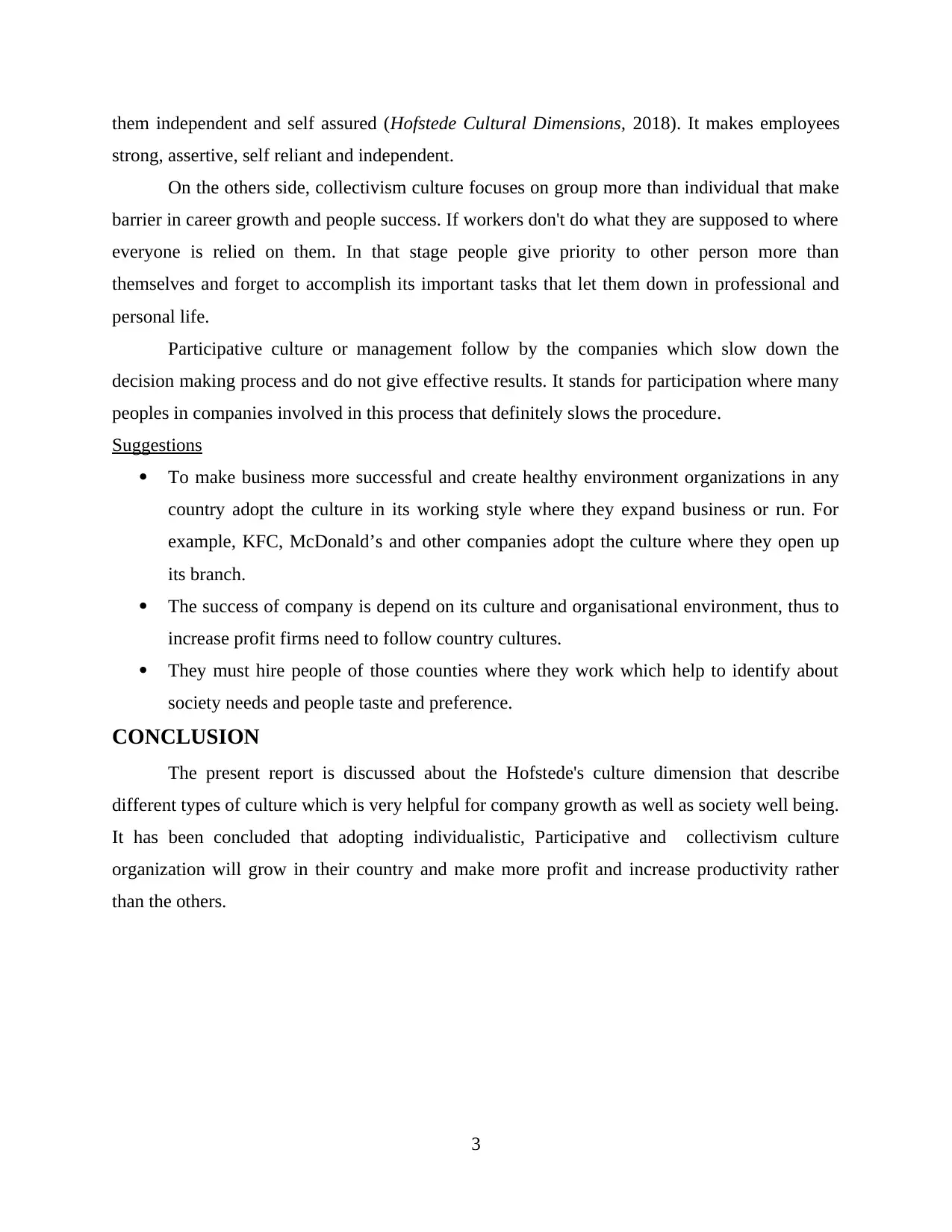
them independent and self assured (Hofstede Cultural Dimensions, 2018). It makes employees
strong, assertive, self reliant and independent.
On the others side, collectivism culture focuses on group more than individual that make
barrier in career growth and people success. If workers don't do what they are supposed to where
everyone is relied on them. In that stage people give priority to other person more than
themselves and forget to accomplish its important tasks that let them down in professional and
personal life.
Participative culture or management follow by the companies which slow down the
decision making process and do not give effective results. It stands for participation where many
peoples in companies involved in this process that definitely slows the procedure.
Suggestions
To make business more successful and create healthy environment organizations in any
country adopt the culture in its working style where they expand business or run. For
example, KFC, McDonald’s and other companies adopt the culture where they open up
its branch.
The success of company is depend on its culture and organisational environment, thus to
increase profit firms need to follow country cultures.
They must hire people of those counties where they work which help to identify about
society needs and people taste and preference.
CONCLUSION
The present report is discussed about the Hofstede's culture dimension that describe
different types of culture which is very helpful for company growth as well as society well being.
It has been concluded that adopting individualistic, Participative and collectivism culture
organization will grow in their country and make more profit and increase productivity rather
than the others.
3
strong, assertive, self reliant and independent.
On the others side, collectivism culture focuses on group more than individual that make
barrier in career growth and people success. If workers don't do what they are supposed to where
everyone is relied on them. In that stage people give priority to other person more than
themselves and forget to accomplish its important tasks that let them down in professional and
personal life.
Participative culture or management follow by the companies which slow down the
decision making process and do not give effective results. It stands for participation where many
peoples in companies involved in this process that definitely slows the procedure.
Suggestions
To make business more successful and create healthy environment organizations in any
country adopt the culture in its working style where they expand business or run. For
example, KFC, McDonald’s and other companies adopt the culture where they open up
its branch.
The success of company is depend on its culture and organisational environment, thus to
increase profit firms need to follow country cultures.
They must hire people of those counties where they work which help to identify about
society needs and people taste and preference.
CONCLUSION
The present report is discussed about the Hofstede's culture dimension that describe
different types of culture which is very helpful for company growth as well as society well being.
It has been concluded that adopting individualistic, Participative and collectivism culture
organization will grow in their country and make more profit and increase productivity rather
than the others.
3
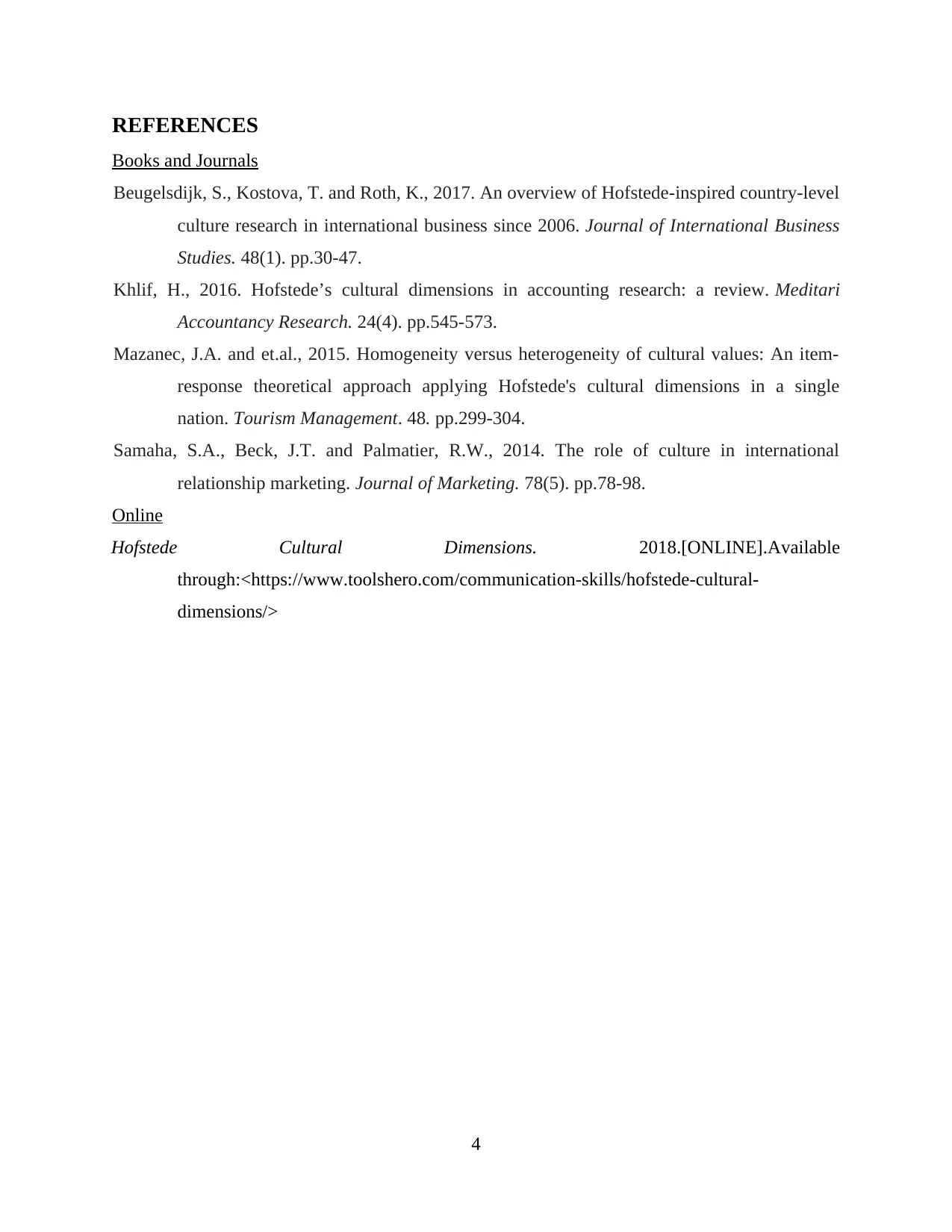
REFERENCES
Books and Journals
Beugelsdijk, S., Kostova, T. and Roth, K., 2017. An overview of Hofstede-inspired country-level
culture research in international business since 2006. Journal of International Business
Studies. 48(1). pp.30-47.
Khlif, H., 2016. Hofstede’s cultural dimensions in accounting research: a review. Meditari
Accountancy Research. 24(4). pp.545-573.
Mazanec, J.A. and et.al., 2015. Homogeneity versus heterogeneity of cultural values: An item-
response theoretical approach applying Hofstede's cultural dimensions in a single
nation. Tourism Management. 48. pp.299-304.
Samaha, S.A., Beck, J.T. and Palmatier, R.W., 2014. The role of culture in international
relationship marketing. Journal of Marketing. 78(5). pp.78-98.
Online
Hofstede Cultural Dimensions. 2018.[ONLINE].Available
through:<https://www.toolshero.com/communication-skills/hofstede-cultural-
dimensions/>
4
Books and Journals
Beugelsdijk, S., Kostova, T. and Roth, K., 2017. An overview of Hofstede-inspired country-level
culture research in international business since 2006. Journal of International Business
Studies. 48(1). pp.30-47.
Khlif, H., 2016. Hofstede’s cultural dimensions in accounting research: a review. Meditari
Accountancy Research. 24(4). pp.545-573.
Mazanec, J.A. and et.al., 2015. Homogeneity versus heterogeneity of cultural values: An item-
response theoretical approach applying Hofstede's cultural dimensions in a single
nation. Tourism Management. 48. pp.299-304.
Samaha, S.A., Beck, J.T. and Palmatier, R.W., 2014. The role of culture in international
relationship marketing. Journal of Marketing. 78(5). pp.78-98.
Online
Hofstede Cultural Dimensions. 2018.[ONLINE].Available
through:<https://www.toolshero.com/communication-skills/hofstede-cultural-
dimensions/>
4
⊘ This is a preview!⊘
Do you want full access?
Subscribe today to unlock all pages.

Trusted by 1+ million students worldwide
1 out of 6
Related Documents
Your All-in-One AI-Powered Toolkit for Academic Success.
+13062052269
info@desklib.com
Available 24*7 on WhatsApp / Email
![[object Object]](/_next/static/media/star-bottom.7253800d.svg)
Unlock your academic potential
Copyright © 2020–2025 A2Z Services. All Rights Reserved. Developed and managed by ZUCOL.





